5th Floor, West Tower, World Financial Centre
1 Dong San Huan Middle Road
Chaoyang District, Beijing 100020, China
Tel: +86 10 5081 5880

December 12, 2022
Shanghai International Financial Center Construction Series Report 2022 Released ...
On November 26th, Shanghai International Financial Center Construction Series Report 2022 (the Report) was released at the 2022 Shanghai International Financial Center (SIFC) Development Forum. The forum was organized by SAIF and co-organized with CCTV Shanghai, the Shanghai Xuhui District People’s Government, and the Shanghai Finance Society. To further promote the construction of the SIFC, SAIF Think Tank organized relevant internal and external experts to set up a special project team. Based on previous projects (Thematic Study on the Revision Project of Regulations on Promoting the Construction of SIFC and SIFC Construction Goals and Development Suggestions) and on development goals proposed in the 14th Five-Year Plan for the Construction of SIFC, the team focused on deepening the financial functions of SIFC and upon the enhancement of Shanghai’s urban capacity. The team summarized the construction experience and development status in key areas of SIFC, analyzed problems encountered in the construction process, and proposed further initiatives for the construction of the SIFC. In 2023, SAIF will release the SAIF-China Economic and Financial Database and the SAIF- International Business Case. The SAIF-China Economic and Financial Database provides complete, rigorous, professional and comparable economic data in order to provide a global authority on China’s financial research and to promote China as a global financial research hub. The SAIF-International Business Case is a collection of case studies on Business Finance, mainly used for finance teaching, practice and popularization. It aims to build an international and localized top-case resource pool, which will cover key industries of social and economic operation and related financial service areas, including, but not limited to: Platform Economy, Asset Management, Family Wealth, FinTech, Technical Finance, and Science & Innovation Parks.
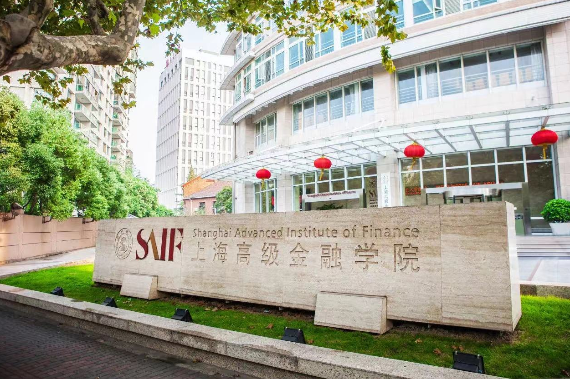
December 12, 2022
2022 Shanghai International Financial Center Development Forum Held and Reported ...
On November 26 2022, the Shanghai International Financial Center Development Forum was held in Shanghai. The forum was organized by SAIF, and co-organized with CCTV Shanghai, the Shanghai Xuhui District People’s Government and the Shanghai Finance Society. Experts, scholars, and representatives of financial institutions were invited to express their insights on “New Journey of Shanghai International Financial Center Construction: Institutional Opening Up and High-Quality Development”. The forum was also reported on by CCTV News. During the forum, the International Financial Center (IFC) Development Report 2022 and the Shanghai International Financial Center (SIFC) Construction Series Report 2022 were released. These reports macroscopically interpreted initiatives and achievements during IFC and SIFC construction, respectively. The forum also witnessed the signing ceremony for the strategic cooperation between CCTV Shanghai and SAIF, the inauguration of the Sustainable Investment Research Center (SIRC) of SAIF, and the establishment of the West Bund Green Finance Alliance. SIRC aims to become a research hub and policy think tank in sustainable investment in China, as well as a high-end talent base for developing a new generation of investors and asset managers. Many other themes were discussed during the forum, including “How to promote the transformation and development of the real economy with Green Finance”, “How to improve the resource allocation system of Green Finance”, and “How to support the structural adjustment of Green Industry”. The Shanghai Green Finance Index was also released which reflects the overall performance of Green Finance in Shanghai. It creatively develops both the Shanghai Green Finance Current Performance Index and the Shanghai Green Finance Social Awareness Index based upon one assessment framework and two sets of methodologies. Both overall scores show that Shanghai is doing well in Green Finance.
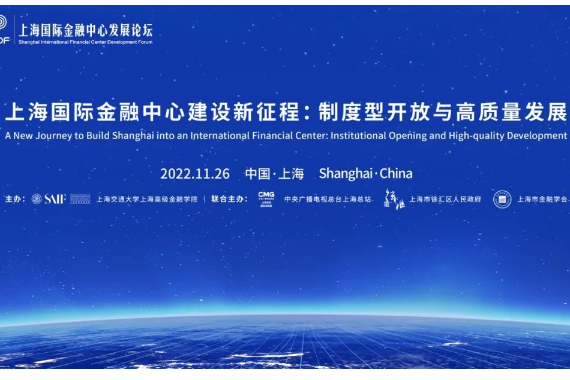
November 30, 2022
Salary of SAIF FMBA 2022 Graduates Hits High
On October 21, SAIF released its Employment Report of the Full-time Financial MBA (FMBA) Graduates. The report showed that the employment level of FMBA graduates improved significantly higher than before enrollment, including: salary, position, and the quality of employment agencies. It demonstrates that the “Finance +” multidisciplinary FMBA graduates have been recognized by the market. According to statistics, 54.7% and 45.3% of this year’s full-time FMBA graduates came from the financial industry and non-financial industry before enrollment, respectively. After two years of systematic education and training through the SAIF FMBA Program — and with guidance from the Career Development Center (CDC) — their professionalism, skills, and global comprehension have been strengthened. This year, many graduates of the FMBA program are still employed in key units — such as the Shanghai Stock Exchange and the State-owned Assets Supervision and Administration Organization. In addition, 75.6% of the FMBA graduates entered the financial industry employers included: CICC, CITIC Securities, Huatai United Securities, Guotai Junan Securities, Everbright Securities Capital Management, and Essence Securities. Meanwhile, the comprehensive skills and cross-border thinking of SAIF FMBA graduates are favored by industry as well. This year, 24.4% of graduates are employed in non-financial industries, working as corporate executives, in consulting/strategic investment, in operations, in project management, and as management trainees. Most of the employed organizations are high-tech enterprises, some of which include Tencent Technology, Contemporary Amperex Technology, and Shanghai Henlius Biotech. In terms of salary, 54 FMBA graduates had an average starting salary of RMB 455,000 (up 26% and 86% over figures from 2021, and before enrollment, respectively), with the median being RMB 400,000 (an increase of 33% and 50% over figures from 2021, and before enrollment, respectively). Shan Wei, an FMBA graduate who joined the Tencent Global MBA Management Trainee Program (Industrial Internet Direction) as a senior business analyst, worked as a senior strategic consultant at IBM Consulting before enrollment. Talking about his learning experience at SAIF, he said: “The professional courses offered by SAIF FMBA helped us to consolidate the theoretical foundation of finance while showing us cutting-edge trends. The practical skills training courses and practical activities conducted by CDC, and the school-enterprise cooperation and industry mentors’ guidance, enabled me to think more about my own positioning and accomplish my own goal of exploring a new career.” As the first MBA program in Finance in China, the SAIF FMBA program has always been committed to cultivating a group of entrepreneurs and professional managers with local influence, international competitiveness, and an innovative spirit. Professor Jie Chang (Academic Director of the MBA Program) said, “Our program, in terms of curriculum, training system and career guidance, focuses on finance as its core, with comprehensive skills. It helps to build up students’ financial knowledge and global vision in all aspects, to better adapt to complex and changing business environments. We will contribute more to China’s economy through their success.”
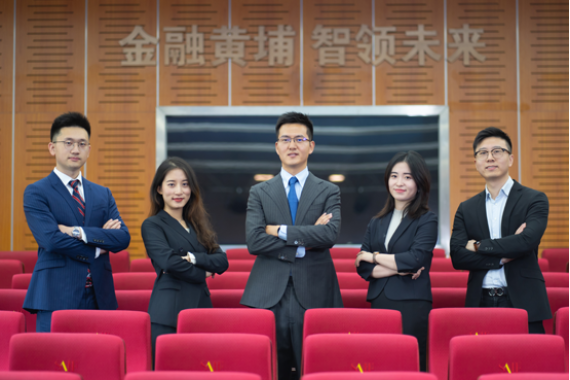
November 30, 2022
Case Authored by Professor Fei Wu Selected for Harvard Business School
A case study on wealth management of family businesses in mainland China, One Tiger Per Mountain: The He Family Office, has recently been selected as a Harvard Business School Case (Harvard Business School Case 223-001). The case was co-authored by Professor Wu Fei (Academic Director of the EED Program at SAIF), Lauren Cohen, (L.E. Simmons Professor at Harvard Business School), and Grace Headinger (Researcher at Harvard Business School). This is the first case study on inheritance solutions for entrepreneurs in mainland China that has ever been selected by Harvard Business School. After over 40 years of reform and opening up, mainland China has bred a large number of private enterprises with assets in the hundreds of millions. According to the “2022 China’s Top 500 Private Enterprises Research and Analysis Report” released by the All-China Federation of Industry and Commerce (ACFIC) in September this year, there are 8,602 private enterprises with annual revenue of 500 million yuan or more, and the threshold for entry into the top 500 enterprises has reached 26.367 billion yuan. “Most of China’s private enterprises are family businesses, which have been established for only a few decades. However, as the first generation of entrepreneurs have begun to enter the twilight of life, the question of ‘How to smoothly hand over to the second generation, or even further develop and expand the enterprise?’ is becoming a new issue. This is also the reason why we started to carry out this research.” Professor Wu Fei said that Harvard Business School is intrigued with this micro-sample of Chinese economy, and that they also hope to analyze business cases of Chinese family enterprise inheritance in order to understand their development tendencies. The case takes the He family in Guangdong as a representative. By focusing on the multiple concerns and typical demands of the founders of entrepreneurs in thinking about the business inheritance, the case analyzed how the founders developed an orderly transition plan of ownership and management by bringing in an external professional family office. The case also discussed “How to balance the relationship between different family branches and different family members with family well-being?”, “How to support the family’s long-term goals through structural and institutional arrangements?”, and “How to promote family unity and family spirit internally and assume social responsibility and public obligations externally?”. In the concrete implementation of this case, an independent professional consultant — HeFeng Family Office (China’s local family office) — successively planned and designed the family’s domestic and foreign ownership structure for the He family. It assisted the He family in setting up governance structures including: the family committee, family trust protector committee, family charitable foundation and family office. It also drafted and revised the governance mechanism, including the family charter and family policies, and assisted the family investment committee in managing its global investment portfolio. As their first case at Harvard Business School, Professor Fei Wu, his two co-authors and the HeFeng Family Office went through several rounds of conferment and refinement. With respect to the case parties, the case embodied to the greatest extent the core issues facing the inheritance of Chinese family businesses, including: entrepreneurship, Chinese family member relationships, ownership and management, leadership inheritance, family business strategic planning, family and family business governance, family offices, family trusts, family investments, charitable foundations and social responsibility, family charters, family policies, family agreements, and family memorials. Fei Wu said, “China’s private economy contributes more than 50% of the country’s tax revenue, more than 60% of GDP, and more than 80% of urban jobs. The smooth pass down and the enterprise’s continuous development are of great significance to consolidate the achievements of China’s reform and development, stabilize social employment and increase tax revenue. We hope that by launching this typical case, we can study more on the topic of reform, development and inheritance of Chinese family enterprises, and provide useful reference and inspiration for other family enterprises.”
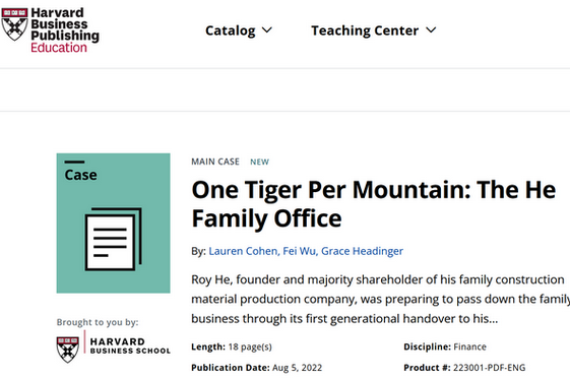
November 30, 2022
2022 SAIF Faculty and Staff Autumn Semester Meeting Held
On October 11th, the 2022 Faculty and Staff Autumn Semester Meeting (the Meeting) was held at SAIF. In the previous meeting of the Faculty Council, Guangshao Tu (Executive Director of the SAIF Board) advised on the arrangement of the Meeting and upcoming work for the new semester. The Meeting was hosted by Qigui Zhu (Secretary of the CPC SAIF Committee). Shijun Cheng (Executive Dean), Jiang Wang (Executive Director, Chair of Academic Council at SAIF), and Tan Wang (MF Program Academic Director) delivered speeches. Over 170 SAIF professors and staff attended the conference. Qigui Zhu first conveyed the spirit of the 8th Plenary Session of the 11th CPC SJTU Committee. He said, “In the Spring and Summer semesters, SAIF guarded the health of the faculty and students with epidemic prevention and control while promoting stable developments. In the Fall semester, we should promote the high-quality development of SAIF based on prevention and control of the epidemic, and welcome the 20th Party Congress with practical actions. We will comprehensively enhance the political function and organizational strength of SAIF and accelerate its construction as a world-class financial institute. When reviewing the work of SAIF in the first half of 2022, Shijun Cheng said that although SAIF faced challenges due to the epidemic, with the joint efforts of all faculty and staff, a number of tasks have progressed smoothly, including: teaching tasks, inter-departmental collaboration, talent training, think tank construction and applied research, and external cooperation. In the Fall semester, Cheng pointed out that 1) SAIF should take talent work as the top priority and continuously innovate with initiatives to attract, employ and retain talent; 2) SAIF should continuously improve at the management level, and strive to form a mechanism for efficient collaboration, resource sharing and pairing complementary advantages; and, 3) SAIF should ensure the orderly advancement of key work —such as talent training, think tank construction and international cooperation — and complete annual work goals with high quality. Jiang Wang, on behalf of the Faculty Council, fully affirmed the progress SAIF has made this year. He thanked all the faculty and staff as well for overcoming difficulties in a pandemic environment and for achieving remarkable results in teaching and research, discipline construction, and resource expansion. He pointed out that, facing a constantly changing environment and further intensifying market competition, we should turn challenges into opportunities. For the next phase of work, Wang emphasized, “We should further strengthen the construction and function of the faculty and talent team, continuously improve the quality of each program, accelerate the expansion of the market of non-academic programs, and the integration of industry-academy-research business. We should also deepen communication and cooperation with the government, schools, alumni and external organizations, and promote all the work to successfully complete the tasks assigned by the Council at the beginning of 2022.”
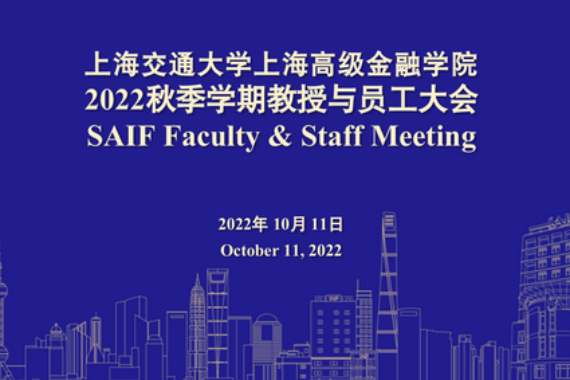
November 30, 2022
2023 SAIF MF International Youth Leadership Finance Summit
The 2023 International Youth Leadership Finance Summit (IYLFS) will be held online January 13th-15th, 2023. IYLFS is a student competition event hosted by the Master of Finance (MF) Program of the Shanghai Advanced Institute of Finance (SAIF) at Shanghai Jiao Tong University. IYLFS provides an interactive learning platform for undergraduate students to cultivate their leadership, communication, and organizational skills. We connect the best students from around the world, and offer them a unique learning experience through hands-on study of business cases and face-to-face communication with business leaders and scholars. Background: As the world is facing long-term challenges including climate crisis, environmental pollution and economic downturn, Environmental, Social, and Governance (ESG) Investing has drawn growing attention from the global investment community. This increased awareness has been spurred on by shifts in demand from across the finance ecosystem, driven both by the search for better long-term financial value and the pursuit of better alignment with values. With a theme of "ESG Investing", the summit invites aspiring young people worldwide to share their ideas, and exhibit their team spirit and leadership. • How shall we expand the product supply and the investment scale of ESG investment? • How shall we improve the infrastructure of ESG investment, and promote the formation of universal standards for information disclosure? • ESG investment is a systematic endeavor. How shall we form a joint force of governments, real economy enterprises, investment institutions, and other entities for ESG investment? Let us find the answers together. Date: January 13th–15th, 2023 Register Here: https://apply.saif.sjtu.edu.cn/user/login/saif/43 *Please complete the application on a PC IYLFS, for You: ● Dive deep into impactful financial topics ● Interact with SAIF faculty and industry leaders ● Meet and compete with the most talented global elite ● Showcase your insights and develop new skills ● Gain international competition experience ● Opportunities to: - Win cash prizes - Get a SAIF MF Admissions Interview Fast Pass - Receive an MF scholarship worth more than 25% of tuition fee* * International participants who win First, Second, or Third Prize in IYLFS and who later enroll in the MF program, can quality for an MF scholarship worth more than 25% of tuition fee. Summit Date: January 13th–15th, 2023 Venue: Online Application and Finalists Selection Procedure: 1. Participants should register and submit applications individually in the IYLFS application system. Eligibility for application: All full-time undergraduate students are welcome; we encourage students from all backgrounds to apply. 2. Participants are to form, on a voluntary basis, teams of 4 to 6 and are encouraged to have team members from different disciplines with diverse academic backgrounds. 3. Each participating team is to choose one of the three topics (listed below) and submit a group research report. The report must be submitted before the deadline. The organizing committee will select the finalists based upon the quality of the reports. Selected teams will present their final reports online. 4. At the final presentation, teams will have a chance to showcase their academic strength and creative thinking in front of a group of experts consisting of professors and industry leaders. A following Q&A session will further provoke thoughts on the topic. * Participating teams are expected to demonstrate unique insights and strong analytical skills. Reports should be written clearly with good quantitative analysis. Topics Topic 1: Financial instruments play an important role in promoting green and sustainable development. Among many green and sustainable financial instruments, Green Bonds and Sustainability-Linked Bonds are favored by investors because of their simple structure. Please conduct a case analysis of either Green Bonds or Sustainability-Linked Bonds. The case analysis may include, but is not limited to, the definition of the bond, its characteristics, its difference from ordinary debt, its importance to ESG, etc. Topic 2: Information disclosure is fundamental to ESG practice. Presently, there have been a number of international standards proposed for ESG information disclosure, and each standard has a different emphasis and characteristics. Please select two disclosure standards which you think are mainstream or important, and elaborate upon and compare the differences and characteristics between the two standards. Topic 3: There is by now a consensus that the carbon emission market plays an important role in helping to reduce carbon emissions and to achieve the temperature control goal of the Paris Agreement. However, the efficient operation of the carbon emission market requires not only a solid theoretical foundation, but also a set of practical protocols for operation. Please take the EU carbon emission market as an example to discuss in detail the protocol of the operation and theoretical foundation of a carbon market. In your discussion, please give particular attention to the accuracy of data and a systematic description of the structure of the market. Language of Report: The research report must be submitted in English. The presentation during the summit will be conducted in English. Application Time: Application period: 21 October – 18 December,2022 Report submission deadline: by 18 December, 2022 at 23:59 Where to apply: https://apply.saif.sjtu.edu.cn/user/login/saif/43 Click the above link or scan the QR code to apply. Please login to the system and apply by using your desktop or laptop web page. Contact Us: No. 211 West Huaihai Road, Shanghai, 200030, China Email: mf.summit@saif.sjtu.edu.cn Tel: 86-21-62934968 WeChat: SAIF-MF Sina Weibo: SAIF_MF Facebook: Saifermaster LinkedIn: SAIF MF Web: http://mf.saif.sjtu.edu.cn
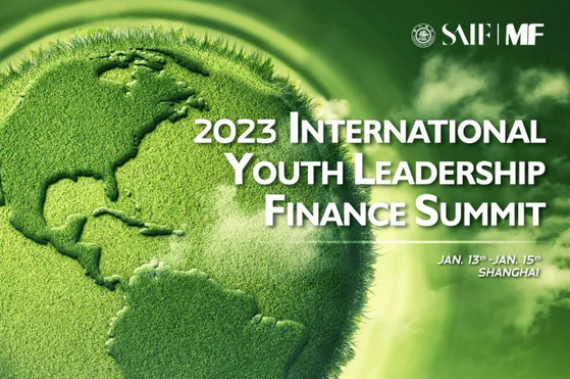
October 17, 2022
SAIF Putuo Center Officially Launched & CGFT Level 3 Certificate Program Rel ...
On September 26, 2022, SAIF officially launched its Putuo Center and SAIFR (an applied research platform) also moved in. This marks further strategic cooperation between SAIF and the People’s Government of Shanghai Putuo District. Both sides will start in-depth cooperation in the CGFT Certificate Program, the industry-academia exchange platform, and the science and innovation financial ecosystem. Guangshao Tu (Member of the CPPCC, Executive Director of the SAIF Board) and Dongdong Jiang (Secretary of Shanghai Putuo District Committee) attended the inauguration ceremony and delivered speeches. The ceremony was presided over by Xuan Luo (Associate Dean of SAIF). Hongzhen Li (Member of the Standing Committee of the Putuo District Committee, Minister of the Organization Department, President of the Party School) and Shijun Cheng (Executive Dean, Professor of Accounting at SAIF), Rulin Yao (Standing Committee Member of Putuo District Committee, Vice Mayor, Party Member), Feng Li (Professor of Accounting, Associate Director of CAFR, Co-Director of SAIFR), and Jie Pan (Associate Dean of SAIF) also attended the ceremony. Tu pointed out in his speech that, with the inauguration of the SAIF Putuo Center and the move-in of SAIFR, we now have a strategic cooperation between the institute and the local government. Since its establishment in 2009, SAIF has taken up the intellectual support mantle for the development of Shanghai as an International Financial Center and China's national financial system. SAIF has resource advantages in financial talent training and research platform construction, while Putuo District shoulders the important task of economic and industrial transformation with its own development advantages. Cooperation between the two sides can be both complementary and synergetic. In turn, this can help the upgrading of Shanghai's fintech industry cluster and accelerate the development of new industries. The simultaneous release of the Chartered Global FinTech (CGFT) Level 3 Certificate Program not only reflects the importance of fintech development for the financial system, but also provides talent and intellectual support for financial institutions to enhance service efficiency and reduce costs in their process of digital transformation. On behalf of Putuo District, Dongdong Jiang expressed his congratulations for the inauguration of the SAIF Putuo Center. He said that the Putuo District will further attract finance enterprises to move-in to upgrade their financial, industrial, innovation, and functional layouts. While building itself a financial landmark and optimizing financial ecology, Putuo will also work together with SAIF and SAIFR to hold influential financial brand activities, and promote interactive exchanges for talent, information, and capital. In January of 2020, the People's Government of Shanghai Putuo District, SAIF, and SAIFR reached a strategic cooperation agreement in order to accelerate the economic and social development of the Putuo District. This will help enhance Shanghai's fintech industry cluster, as well as to accelerate the pace of building SAIF as an international first-class finance institute. Furthermore, we expect to provide solutions for the development of the financial industry and to cultivate superb and practical talent. According to the agreement, the three sides will strengthen financial research exploration and practice, carry out all-round talent training, and conduct research on pressing issues of financial industry development in the Putuo District. The inauguration of the SAIF Putuo Center and the official settlement of SAIFR is an important step to deepen strategic cooperation among the three sides. The newly inaugurated SAIF Putuo Center is yet another teaching satellite of SAIF after the Shanghai Xuhui Campus, the Beijing Center, and the Shenzhen Center. Equipped with classrooms, meeting rooms, recording rooms, and offices, it will serve as the main office of SAIFR in the future. At the ceremony, Feng Li officially launched the CGFT Level 3 Certificate Program on behalf of SAIFR. In June 2020, the program was first launched in China to match the development trend of fintech in China and overseas, to further the construction of Shanghai as an International Financial Center, and to meet the urgent demands of the market for fintech talent. The program integrates Finance, Law, and Technology together and provides multi-dimensional courses to cultivate innovative, practical, and professional fintech talent. The CGFT Level 1 course focuses on the cognitive establishment of a complete knowledge system. The CGFT Level 2 course, launched in June of this year, focuses on the in-depth integration of course knowledge with specific application scenarios. The newly released Level 3 course focuses on the expanding breadth of exploration, further realizing the integration of finance and technology. In addition, the program introduces international cutting-edge theoretical research results and leading training system. A large number of application-oriented cases cover whole scenarios of application. Feng Li pointed out that the CGFT program has been widely supported and recognized by regulatory authorities and local governments. In August 2021, CGFT holders were listed in the FinTech Shortage Talent Directory of the 14th Five-Year Shortage Talent Development Directory of Shanghai's Key Fields (Finance). Since its launch, the program has reached strategic cooperation agreements with more than 20 leading financial institutions, covering more than 20 provinces and cities, and more than 100 universities across China.
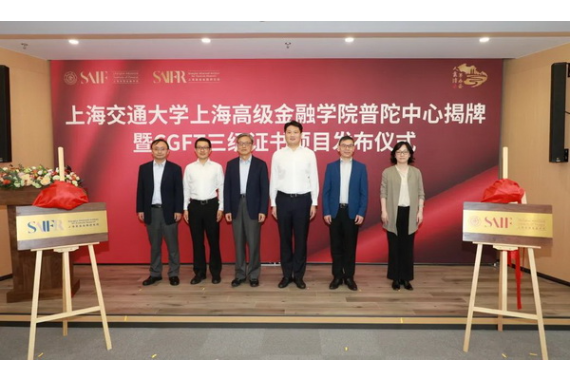
October 12, 2022
Placement Data for SAIF MF 2022 Graduates Released
Recently, SAIF released the Employment Report for MF (Master of Finance) Graduates in 2022. It not only showed that the average annual starting salary hit a record high, but also showed the internationalization and high level of employment compared with previous years — fully demonstrating the strong competitiveness of SAIF MF graduates in the job market. There were 72 SAIF MF graduates in total this year. Apart from two graduates who decided to continue their studies, the placement rate of the other 70 graduates was 100%. As SAIF's flagship program, SAIF MF has been taking the lead in employment data among comparable institutions and universities. According to statistics, SAIF MF domestic graduates of Class 2022 received 2.2 job offers on average, with 90% of them having already determined job intentions six months before graduation. “The demand for talent recruitment in various industries is becoming more and more cautious under the current global economic situation. Under this circumstance, our graduates maintain a high-level employment. It proves that SAIF's ‘International, Market-Oriented, Professional’ teaching philosophy, continuous innovation, and advancing training model that we adhere to have been generally recognized by the society.” said Professor Shijun Cheng (Executive Dean of SAIF). When choosing jobs, many SAIF graduates combine their personal development with the destiny of China itself. Facing multiple job offers, about 18% of MF domestic graduates chose to join key national employment units such as financial regulatory departments and strategic financial institutions instead of pursuing higher income opportunities in the private sector. In addition, more than two-thirds of this year's MF domestic graduates chose to work in Shanghai to serve the national strategy of building Shanghai as an International Financial Center. In terms of specific employment data, the average and median numbers for annual starting salary were RMB 562,000 and RMB 498,000 respectively, hitting a record high. In addition, an increasing trend of internationalization was revealed: one-third of the graduates joined foreign financial institutions after graduation, and more than 11% of the graduates worked in international financial centers such as New York, Singapore, and Hong Kong. Foreign employers included renowned international investment banks (Goldman Sachs, JP Morgan, Morgan Stanley, Bank of America Merrill Lynch, Credit Suisse, and Barclays) and traditional banking institutions (JP Morgan Chase Bank, HSBC, and Standard Chartered Bank). Apart from the traditional hot employment industry — the investment banking/securities industry which was chosen by nearly 30% of graduates — asset management institutions attracted about half of the MF domestic graduates this year. The employers included top international asset management institutions (BlackRock, Black Stone Group, and JPMorgan Asset Management), domestic head public funds (Efund, Harvest Fund, Aegon Industrial Fund, Zhong Ou Asset Management), and quantitative private equity institutions with high asset management scale in China (UBI Quant, Investment, Ming Hong Investment, Ming Shi Investment). “SAIF graduates gain recognition of the job market due to three key reasons.” Professor Tan Wang (Professor of Finance at SAIF, Academic Director of the MF program) said. “First is Internationalization, Market-Orientation, and Specialization. SAIF always keeps abreast with the international frontier in terms of school mode, curriculum and faculty construction, and closely integrates with China’s financial talent needs and national strategies. The second is Innovation. In 2019, SAIF first set up its FinTech Track in China, which adds machine learning, computer programming and application courses based on systemic finance courses, allowing students to learn blockchain, big data, and machine learning courses more systematically. Third, SAIF focuses on combining theoretical learning and practical courses, with practical courses accounting for more than 40%.” The MF Program is a full-time flagship program launched by SAIF in 2009. All of its students have graduated from world-class universities, and the average admission rate is below 3%. With all courses taught in English, the SAIF MF Program trains international financial professionals who are proficient with modern financial theory, techniques, and skills — and are familiar with the practices of the financial sector in China and across the world. Compared against other similar programs in China, SAIF MF features world-class faculty from leading international universities, a systematic curriculum design, market-oriented practice programs, and career development counseling. In addition, its modern teaching approaches are supported by a simulation laboratory. Students not only have the opportunity to participate in joint admission programs with world-renowned institutions such as Columbia University or the London School of Economics, but also enjoy access to international resources and exclusive short-term overseas modules from all over the world. In addition to a cutting-edge and diverse curriculum, SAIF also provides students with personal and comprehensive career guidance. To help students achieve better career development, SAIF CDC has created the Career Practical Training Program (CPTP) to cultivate students’ professionalism and ability to solve practical problems. The courses include lectures, seminars, and workshops that improve students’ soft skills and job-seeking skills. A series of professional skills that simulate industry practices, covering different modules — such as LPG courses of foreign investment banks, equity research, quantitative trading, and valuation modeling — are also included. Meanwhile, each MF student will receive personal targeted career counseling at least three times during their study at SAIF, with an average total time of more than 5 hours. “We want to teach students not only traditional financial theories but also cutting-edge skills like Fintech, the ability to think systematically and with a spirit of innovation. This will help SAIF MF students to develop continuously in the next ten years and beyond. MF students can better serve the China's financial development and contribute to the construction of Shanghai as an International Financial Center.” Professor Tan Wang said.
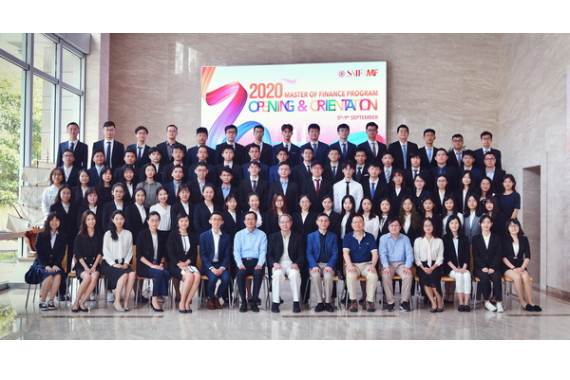
October 10, 2022
SAIF Academically Supports Shanghai FinTech Center Activity
On September 13, 2022, the Outstanding Achievements Collection and Promotion Activity on the Third Anniversary of the Construction of Shanghai FinTech Center and the Annual Key Work Kick-off Meeting of the Shanghai FinTech Industry Alliance (the Meeting) was held under the guidance of the People's Bank of China Shanghai Headquarters and the Shanghai Municipal Financial Regulatory Bureau. The Meeting was organized by the Shanghai FinTech Industry Alliance (the Alliance), co-organized by the Shanghai Financial Industry Federation and supported by SAIF. Representatives from more than 50 institutions, including various financial markets, financial institutions, and technology enterprises in Shanghai attended the meeting online. Professor Guangshao Tu (Member of the CPPCC, Executive Director of the SAIF Board), the general advisor of the activity, said that in the Opinions of the CPC Central Committee and State Council on Supporting the High-Level Reform and Opening-up of Pudong New Area to Build a Leading Zone for Socialist Modernization released last year, the central government has guided Shanghai as an International Financial Center to: serve the real economy, serve economic and social development, serve the deepening of Shanghai’s urban functions, enhance Pudong’s leading role, emphasize interaction with the development of the real economy, and the building of a new development pattern. Since the reform and opening up, domestic financial market systems, structure, functions, and effectiveness have been greatly enhanced. This further promotes fintech with a wider range of fintech application scenarios. Tu said that as an International Financial Center, Shanghai has comprehensive advantages in building a FinTech Center because of its healthy financial system and friendly financial environment. Shanghai has the ability to undertake some major financial reforms and open policies, such as pilot financial innovation initiatives, including: measures involving the internationalization of the CNY, including the pilot cross-border trade CNY settlement in 2009 and the establishment of a free trade zone in 2013; and major market reform measures, such as registration system reform. In 2019, Shanghai began to build itself a FinTech Center and proposed to build a globally competitive FinTech Center within five years. Tianyu Wang (Secretary General of Shanghai Fintech Industry Alliance) said that an activity was held to summarize the innovative practical experience of Shanghai in building the FinTech Center over the past three years. In the future, the Alliance will continue to promote research on financial technology, promote collaborative innovation among institutions, and provide strong support for a regular collection mechanism for outstanding future achievements. As the academic support unit, SAIF participated in the preliminary research on the development of fintech applications and the summarization of Shanghai's innovative practical experience in building a FinTech Center. It evaluated the development results of Shanghai's fintech industry, and put forward targeted and valuable suggestions on this activity. Professor Feng Li (Professor of Accounting, Associate Director of CAFR, Co-Director of SAIFR) said that Shanghai has gradually shown its global fintech advantages, and its activity would promote Shanghai to maintain its advantages and continue fintech development. In the future, SAIF would capitalize upon its research efforts in fintech and digital finance to further serve the overall national strategy and the construction of Shanghai as a FinTech Center.
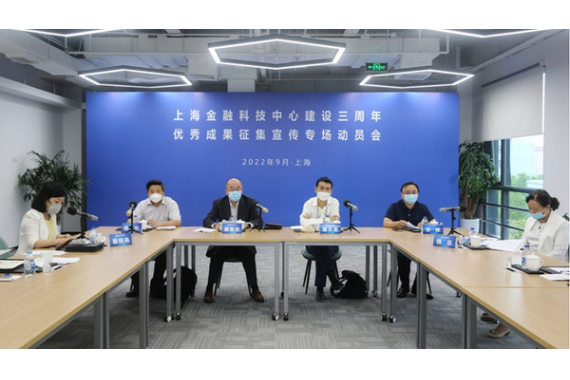
October 08, 2022
China Fintech Industry Trends Seminar Held by SAIF Think Tank
On September 5, 2022, SAIF Think Tank and the CAFR- FinVolution Joint Research Laboratory at SJTU jointly held a seminar on Investment and Financing Trends in China’s Fintech Industry. Professor Guangshao Tu (Member of the CPPCC, Executive Director of the SAIF Board) and Ping Ge (Deputy Director of Shanghai Municipal Financial Regulatory Bureau) attended the seminar. The seminar was presided over by Professor Feng Li (Professor of Accounting, Associate Director of CAFR, Co-Director of SAIFR). Professor Tu pointed out that the development of digital finance and fintech has had a profound impact on financial systems, markets, and institutions — with a series of system construction and policy initiatives being put forward by relevant national departments. Currently, the construction of Shanghai as an International Financial Center has entered the “Version 3.0” stage. Shanghai has also proposed an implementation plan of building itself as a Global FinTech Center during the 14th Five-Year Plan to make Shanghai a pilot zone for: fintech research, innovation and application, industry concentration, talent gathering, standards formation, and supervision innovation. Therefore, it is of great importance to develop research and analysis on digital finance and fintech. Ping Ge said that Shanghai is promoting strategic deployment for the city's digital transformation, such as: the application of big data for finance, a capital market fintech innovation pilot project, a digital currency electronic payment pilot project, and a local financial supervision information platform. Shanghai is at the forefront of the national pilot project for digital currency electronic payments, and has made significant breakthroughs in the core assessment such as the number of transactions and application scenarios. In the discussion session, scholars and experts from different institutions expressed their views on the state of current investment and financing in both the domestic and international fintech industries, and the future regulation of the industry. They included: Jiandong Shi (Director of Science and Technology Division, Financial Services Department II, People’s Bank of China Shanghai Headquarters), Bin Liu (Director of Financial Research Department, Institute of Shanghai Pudong Reform and Development), Suyang Zhang (Managing Partner of Shanghai Volcanics Venture), Hua Chen (President of Shanghai Guoxin Venture), Ye Zhou (Alumnus of the first GES class, President and CEO of HuiPay Payment), Daquan Yang (Alumnus of the second EMBA class, Vice President of Shanghai Jiemian Network Technology), Min Qi (Vice President of Shanghai IceKredit), Xiaochun Liu (Vice President of CAFR), and Jie Hu (Professor of Practice at SAIF). In the future, SAIF Think Tank will further focus on three major research areas, namely “Shanghai International Financial Center Construction”, “International Finance”, and “Fintech”. To better serve the construction of Shanghai International Financial Center, SAIF endeavors to give an academic interpretation of major policies and focused events, and conduct high-level seminars in economic and financial fields.
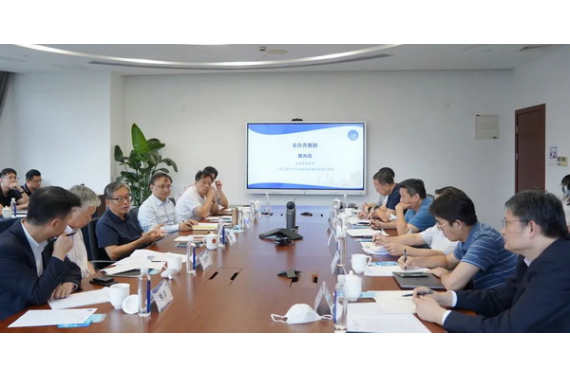

211 West Huaihai Road
Shanghai 200030, China
Tel: +86 21 6293 3500
9th Floor, Building T6, Hongqiao Hui
990 Shenchang Road
Shanghai 201106, China
3rd Floor, Building D, Chenfeng Building
800 Tongpu Road
Shanghai 200062, China
5th Floor, West Tower, World Financial Centre
1 Dong San Huan Middle Road
Chaoyang District, Beijing 100020, China
Tel: +86 10 5081 5880
1203 Tower 7, One Shenzhen Bay
Nanshan District, Shenzhen 518000, China
Tel: +86 755 8663 8815
© Shanghai Advanced Institute of Finance All Rights Reserved.


Top